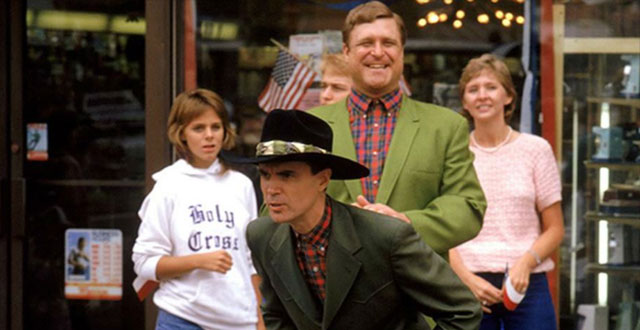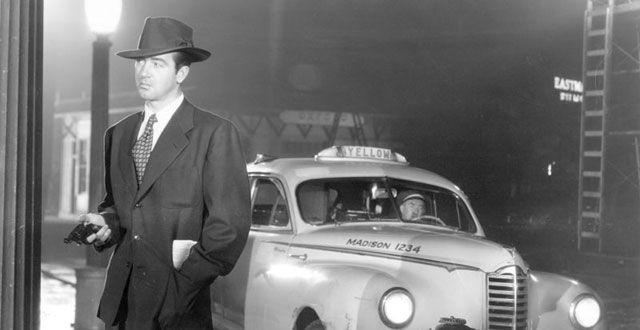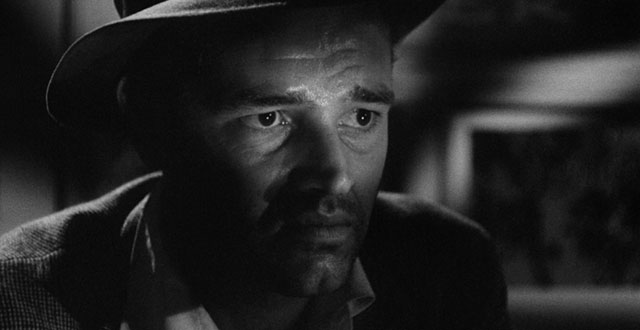News
Celebrate Film Restoration with the Wexner Center
Hope Madden
For the fifth consecutive year, the Wexner Center for the Arts celebrates the art and artistry of film restoration with its Cinema Revival festival. The program offers moviegoers the chance to see beautifully restored films — groundbreaking classics, blockbusters and underseen gems — while digging into the process that protects these treasures for viewers of today and tomorrow.
The five-day event kicks off Thursday, February 21 and runs through Tuesday, February 26, offering a docket of 16 films as well as conversations with some of the craftspeople who brought these cinematic gems back from the brink.
Among the lineup of highlights is a restoration of Taylor Hackford’s 1985 Russian intrigue and dance film, White Nights.
“In 1985 when it was released, it was a really big film, but I feel like it’s kind of fallen by the wayside,” says Rita Belda, Vice President of Asset Management, Film Restoration and Digital Mastering for Sony. “Because the main characters are trapped in Russia and they’re part of a political game, it felt like it was interesting to revisit now.”
Belda’s department is responsible for Sony’s entire feature film and television catalog.
“Our job is to manage the assets,” she says, “to preserve them, protect them and make sure that they last into the future. Our mission is to make sure that all of the films in the library are preserved and available for viewing.”
She recalls a time when a request for White Nights drew her attention to the rough quality of the title in Sony’s archive.
“A few years ago I got the request to send a DCP of White Nights to the Chicago Film Festival,” she says. “I started looking into the materials and I was really unhappy with what we had. It didn’t hold up to the artistry of the film.”
She felt the film deserved better.
“The cast is amazing. The performances are incredible,” she says. “And just the opportunity to see Gregory Hines and Mikhail Baryshnikov on the big screen is really powerful. When the material doesn’t hold up to the original vision, it becomes a challenge to me for restoration, to get the material back to the quality that audiences would have seen in the original release.”
When schedules aligned and funds became available, White Nights landed on Belda’s restoration docket.
“We started with the original negative,” she recalls. “It was dirty. So we scanned the negative at 4K and then we evaluated it further for dirt and scratch and did a full digital restoration, and then we pulled in the director, Taylor Hackford, who oversaw the color correction and audio restoration.”
Says Belda, Hackford’s collaboration on the project made for an incredible experience.
“He expressed to me that he was really thrilled that we were able to go back and do this in a major 4K restoration,” she says. “He was very generous with his time and his stories.”
She recalls one particular episode when Hackford was especially careful in guiding the color correction of a scene starring his wife, Helen Mirren.
“It was one of my favorite moments,” she says. “There was a shot where the light fell off of her face, and that was a shot that he was particularly interested in making sure it was perfect. That was something I thought was really lovely.”
A returning expert for Cinema Revival, Belda’s excited to get the chance to participate again and learn from other speakers in the program.
“I am a really big fan of the Wexner Center and what they do,” she says. “I think it’s awesome that David (Filipi) and his team are exposing people to the art and artistry of both cinema and the people who are working so hard to preserve cinema. It’s incredible to be a part of that.”
She’s also eager to premiere the newly restored White Nights with a Columbus audience.
“I am excited to present this film because I think a lot of people have not seen it, certainly not in a theatrical context,” she says. “That’s where the preservationist and the film fan in me come together. It’s great to be able to preserve the film and it’s even better to watch them with an audience. That’s what I’m looking forward to, because it’s a really excellent opportunity to visit with people in Columbus and show them this movie, but it’s not much work.”
Full Cinema Revival lineup:
Thursday, February 21
4:30 p.m. The War at Home (1979) 4K restoration
7:30 p.m. Filibus (1915), introduced by Amy Heller and Dennis Doros, Milestones Films
Friday, February 22
4:30 p.m. From ‘Sunrise” to “Die Hard”: The History of 20th Century Fox, presented by Shawn Belston, 20th Century Fox
7 p.m. True Stories (1986), introduced by Lee Kline, Criterion Collection
Saturday, February 23
12 p.m. Notorious (1946), Introduced by Eric Luszcz, Criterion Collection
2:30 p.m. Detour (1945), introduced by John Polito, Audio Mechanics
4:45 p.m. Prisoners of the Earth (1939), introduced by Margaret Bodde, The Film Foundation
6:30 p.m. Cinema Revival Reception
7:30 p.m. White Nights (1985), introduced by Rita Belda, Sony Pictures
Sunday, February 24
11:30 a.m. Laurel and Hardy X 4 (Helpmates [1932], County Hospital [1932], Busy Bodies [1933], That’s That [1937])
1:30 p.m. Battling Butler (1926), introduced by Tim Lanza, Cohen Film Collection
3:30 p.m. That Brennan Girl (1946)
Monday, February 25
4:00 p.m. Les rendez-vous d’Anna (1978)
Tuesday, February 26
7 p.m. Claudine (1974) with postscreening conversation with Simone Drake
Festival passes are $30 for members, students and seniors, $35 for the general public.
Purchase festival passes or individual movie tickets at www.wexarts.org.
2019 UCLA Festival of Preservation offers a weekend of cinematic rarities and surprises
Kenneth Turan
Can you improve on the best? Can you make the most anticipated event on the calendars of discerning cinephiles even more fun and festive? The UCLA Film & Television Archive is about to try.
The occasion in question is the beloved UCLA Festival of Preservation, the 19th edition of which is filled, as always, with a deeply satisfying cornucopia of films, forgotten gems and rarely revived classics that never fail to both astonish in their diversity and dazzle in their newly restored glory.
But while previous iterations of the festival have spread their riches over a month of screenings, this year’s celebration, which opens Friday at the Hammer Museum’s Billy Wilder Theater in Westwood, is going to fit its offerings into one very busy and exciting weekend.
For the first time, the festival’s 23 programs are going to run consecutively, starting at 9 a.m. Friday and lasting until midnight and beyond all three days.
You can buy tickets to individual programs or, if you are feeling especially festive, you can splurge for a $50 pass that lets you experience every last one of them, which at about $2 per event is quite the bargain for those with the necessary stamina.
The 1930 Stan Laurel and Oliver Hardy short "Hog Wild," directed by James Parrott, screens Feb. 17. (UCLA Film & Television Archive)
Once again, the variety of films and television, all restored by UCLA, is astonishing, running the gamut from the antics of Laurel and Hardy to austere independent gems like Christopher Munch’s “The Hours and Times” to one of a kind programs such as “U.S. Presidents In the Hearst Newsreels,” going from William McKinley to Lyndon Johnson with lots of folks in between.
Classics of various genres also get their due, including 1958’s original television version of “Days of Wine and Roses” with Piper Laurie and Cliff Robertson as the protagonists.
“The Mortal Storm” directed by Frank Borzage in 1940, was one of Hollywood’s most prescient films, starring Margaret Sullavan, James Stewart and Robert Young in the story of a Jewish family destroyed by the Nazi party, which is said to be one of the reasons American films came to be banned in Germany.
A scene from the 1946 film "Enamorda." (UCLA Film & Television Archive)
A splendid work of a very different type is 1946’s Mexican standout “Enamorda,” a tale of the Mexican Revolution inspired by Shakespeare’s “The Taming of the Shrew.” Starring María Félix and directed by Emilio Fernández, it benefits from the gorgeous cinematography of Gabriel Figueroa.
One of least known films in the festival, 1933’s “My Lips Betray,” is a lighter-than-air piece of fluff that starts the weekend off.
“Lips” stars the charming Lilian Harvey, one of Germany’s most popular stars who had a brief Hollywood moment, as a singer who captures the heart of a king. Look for a cameo by Mickey Mouse.
As a fan of the brooding film noir genre, it’s a pleasure to report that UCLA has restored several features that fit that description. Best of these are two from 1949: “The Crooked Way” and “Trapped.”
Starring John Payne as a World War II vet with amnesia who shows up in L.A. and discovers his criminal past, “The Crooked Way” benefits from the cinematography of the legendary John Alton.
Perhaps the greatest of noir cinematographers, Alton gives a master class in the creation of ominous, engulfing shadows, breathing life into noir staples like rain-slicked streets, deserted warehouses and sinister window blinds.
Also excellent is “Trapped,” starring Lloyd Bridges in his pre-“Sea Hunt” days as a counterfeiter who tries to play both ends against the middle. Also a visual treat, this Richard Fleischer-directed film has a crackling conclusion shot in a long-gone Red Car depot in downtown L.A.
Allene Roberts and Edward G. Robinson in the 1947 film "The Red House," directed by Delmer Daves. (United Artists / Photofest / UCLA Film & Television Archive)
Ready for more noir? Also benefiting from fine acting and a great location is 1951’s “The Man Who Cheated Himself,” starring Jane Wyatt a long way from “Father Knows Best” and a gruff Lee J. Cobb in a tale that twists and turns all the way to San Francisco’s iconic Fort Point.
Almost unclassifiable is Delmer Daves’ 1947 “The Red House,” half-psychological drama, half-thriller, that boasts an unnerving Miklos Rozsa score and a disturbing performance by Edward G. Robinson as a man who says things such as “you can’t run away from a scream.”
The preservation festival items that surprised me the most this year were silent, starting with two hours of “Preserved Silent Shorts and Fragments.”
This program showcases ultra-rare work from 1910 through 1916, when short films were top of the heap, and gives us a glimpse of what the world looked like physically as well as story-wise a full century ago.
Pauline Frederick, standing, in the 1925 silent film "Smouldering Fires," directed by Clarence Brown. (Universal Pictures / Photofest / UCLA Film & Television Archive)
The one silent feature in the festival, 1925’s “Smouldering Fires,” is as unusual as its title. Directed by Clarence Brown, later Greta Garbo’s director of choice, it stars Pauline Frederick in a serious, sophisticated piece of work about love, age and power dynamics. It’s not at all what you might expect, which is just what the Festival of Preservation is all about.
-------------
2019 UCLA Festival of Preservation
Where: Billy Wilder Theater, Hammer Museum, 10899 Wilshire Blvd, Westwood. cinema.ucla.edu
When: Feb. 15-17
Cost: $8-$10; festival pass, $50
Feb. 15: “My Lips Betray,” 9 a.m.; “Voice In The Wind,” 10:41 a.m.; Selling L.A. Television: Local Kinescopes and Film Fragments, 1:40 p.m.; “The Crooked Way,” 3:15 p.m.; “El Fantasma del Convento,” 5 p.m.; “The Mortal Storm,” 7:30 p.m.; “Trapped,” 9:47 p.m.; “The Man Who Cheated Himself,” 11:20 p.m.
Feb. 16: “Playhouse 90: Days of Wine and Roses,” 9 a.m.; Preserved Silent Shorts and Fragments, 11:05 a.m.; Selections From TV’s “Stars of Jazz,” 2:08 p.m.; “The Killing Floor,” 3:43 p.m.; “Enamorada,” 6:46 p.m.; “Smouldering Fires,” 8:40 p.m.; “The Red House,” 10:20 p.m.
Feb. 17: “Alibi,” 9 a.m., Newly Restored Animation, 10:50 a.m.; Laurel and Hardy: Fugues of Destruction, 1:11 p.m.; U.S. Presidents in Hearst Newsreels, 2:53 p.m.; “Operation Bootstrap,” 5:08 p.m.; “Gay USA,” 7:36 p.m.; “The Hours and Times,” 8:59 p.m.; “A Boy And His Dog,” 10:11 p.m.
Wex Celebrates Film Restoration with 5th Annual Cinema Revival
Thursday, February 21–Tuesday, February 26, the Wexner Center presents Cinema Revival: A Festival of Film Restoration, an annual celebration of the art and practice of film restoration and preservation. Now in its fifth year, the fest comprises 15 recently restored films spanning 71 years, along with engaging presentations by 10 leading restoration experts. From revitalized classics to a guided history through one of the original Hollywood studios, Cinema Revival features something for everyone interested in the art and practice of preserving cinematic treasures.
“Outside of major festivals such as Telluride or archives such as the Academy, The Museum of Modern Art, or UCLA, there really isn’t another event like this in the country,” says David Filipi, the center’s Director of Film/Video and organizer of the festival. “It’s an incredible opportunity not only to learn about the technical aspects of film restoration from the experts, but also to hear the passion and dedication of these committed professionals. But the main thing, of course, is to see a weekend of great films.”
Among the highlights this year are: the US restoration premiere of the Italian film Filibus (1915), about a gender-bending super-criminal; a program of recently restored Laurel and Hardy comedy shorts in 35mm; and the 4K restoration world premieres of Hitchcock’s Notorious (1946), starring Cary Grant and Ingrid Bergman and the 1980s prestige picture White Nights (1985), starring dancers Gregory Hines and Mikhail Baryshnikov.
Experts representing the Criterion Collection, Sony Pictures, 20th Century Fox, Milestone Films, the Cohen Film Collection, Martin Scorsese’s Film Foundation, and Audio Mechanics, the foremost sound restoration company in Hollywood, will introduce screenings throughout the festival.
“I am thrilled that David has selected Prisoners of the Earth (1939) and Detour (1945) for this year’s Cinema Revival program at the Wexner Center––an essential event on every film lover’s calendar since its inception five years ago,” says Margaret Bodde, Executive Director of The Film Foundation, who will introduce the Argentine masterpiece Prisoners of the Earth.
“These two films are among 32 restored last year by The Film Foundation. While relatively unknown, Prisoners of the Earth, restored by the Cineteca di Bologna/L’Immagine Ritrovata, is considered among the greatest films ever made in Argentina, and is one of the only remaining documents of the Guarani dialect. Though better known, Detour will newly astound fans of this noir cult classic, stunningly restored by the Academy Film Archive. Both projects have been restored thanks to generous support from the George Lucas Family Foundation.”
“Preservation efforts are meaningless without robust exhibition programs. Festivals such as Cinema Revival create essential opportunities for people to come together and experience these films on the big screen with an appreciative audience,” Bodde adds. “Films provide a glimpse into our shared history and it is vitally important to support great exhibition programs—at great institutions like the Wex—that help our communities thrive.”
Guests can also mingle with the experts at a public reception from 6:30 to 7:30 pm on Saturday, February 23.
A festival pass includes admission to all talks and screenings as well as the Wex exhibitions John Waters: Indecent Exposure and Peter Hujar: Speed of Life, plus access to an exclusive passholder lounge with complimentary coffee, soft drinks, and snacks.
BERLINALE CLASSICS – FINAL LINE-UP OF SIX FILMS
A total of six Berlinale Classics will be screening as part of the Retrospective at the 69th Berlin International Film Festival. The Berlinale will mark a world premiere of the restored versions of five of the films, and the international premiere of one. In addition to classics from Germany, Denmark, and Hungary (see press release of December 12, 2018), the series will include film classics from the USA, Norway, and South Korea.

Source: National Library of Norway
Atle Merton and Liv Ullmann in Ung Flukt (The Wayward Girl) by Edith Carlmar
It is the first time that Berlinale Classics will be showing a film from Norway, which is also the Country in Focus at this year’s European Film Market (EFM): Ung flukt (The Wayward Girl, 1959), based on a book by Nils Johan Rud, is the last feature made by director Edith Carlmar. It’s the story of 17-year-old Gerd and her boyfriend, who survive on fresh air and love in a remote cabin. Then a drifter turns up whom the young girl quite fancies. In her first lead role, Liv Ullmann plays an adolescent who is as vivacious as she is fragile. For the digital restoration, the National Library of Norway used a scan of the original 35mm material and the original sound negative to create a DCP of outstanding quality.

© Universal Pictures
James Stewart and Marlene Dietrich in Destry Rides Again by George Marshall
Destry Rides Again (USA 1939) was directed by George Marshall and stars Marlene Dietrich and James Stewart. The film was restored by Universal Pictures in collaboration with Martin Scorsese’s The Film Foundation. It is a rip-roaring, style-setting western comedy about a sheriff who eschews the use of weapons. Released at the start of World War II, the film carried an unvarnished message cautioning against US appeasement policy towards the Third Reich. The primary element used for the restoration was a 35mm nitrate composite fine grain. Restoration services were provided by NBCUniversal StudioPost, which performed a wet gate scan and was responsible for the entire 4K workflow. Universal expresses special thanks to Martin Scorsese and Steven Spielberg, who consulted on the restoration.

© KOREAN FILM ARCHIVE
Jagko (Pursuit of Death) by Kwon-taek Im
Im Kwon-taek’s 1980 film Jagko (Pursuit of Death) is the story of a former South Korean officer who spends 30 years trying to track down a former guerrilla fighter from the communist North. This political parable about a grim (anti-) hero reflects the tragedy of a country divided since 1945. Jagko was restored in 2K by the Korean Film Archive using the 35mm original negative. The restoration included replacing missing frames, correcting wear and tear and colour fading, and conforming the digital version as far as possible to the original version.
The full programme of Berlinale Classics:
Destry Rides Again
dir: George Marshall, USA 1939
World premiere of the digitally restored version
in 4K DCP
Jagko (Pursuit of Death)
dir: Im Kwon-taek, South Korea 1980
International premiere of the digitally restored version
in 2K DCP
Ordet (The Word)
dir: Carl Theodor Dreyer, Denmark 1955
World premiere of the digitally restored version
in 4K DCP
Örökbefogadás (Adoption)
dir: Márta Mészáros, Hungary 1975
World premiere of the digitally restored version
in 4K DCP
Die Sieger (The Invincibles), Director’s Cut
dir: Dominik Graf, Germany 1994
World premiere of the digitally restored version
in 4K DCP
Ung flukt (The Wayward Girl)
dir: Edith Carlmar, Norway 1959
World premiere of the digitally restored version
in 4K DCP
Press Office
January 9, 2019




